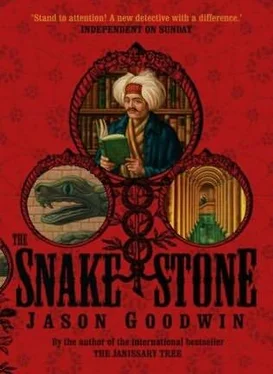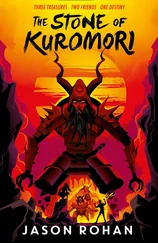Jason Goodwin - The snake stone
Здесь есть возможность читать онлайн «Jason Goodwin - The snake stone» весь текст электронной книги совершенно бесплатно (целиком полную версию без сокращений). В некоторых случаях можно слушать аудио, скачать через торрент в формате fb2 и присутствует краткое содержание. Жанр: Исторический детектив, на английском языке. Описание произведения, (предисловие) а так же отзывы посетителей доступны на портале библиотеки ЛибКат.
- Название:The snake stone
- Автор:
- Жанр:
- Год:неизвестен
- ISBN:нет данных
- Рейтинг книги:4 / 5. Голосов: 1
-
Избранное:Добавить в избранное
- Отзывы:
-
Ваша оценка:
- 80
- 1
- 2
- 3
- 4
- 5
The snake stone: краткое содержание, описание и аннотация
Предлагаем к чтению аннотацию, описание, краткое содержание или предисловие (зависит от того, что написал сам автор книги «The snake stone»). Если вы не нашли необходимую информацию о книге — напишите в комментариях, мы постараемся отыскать её.
The snake stone — читать онлайн бесплатно полную книгу (весь текст) целиком
Ниже представлен текст книги, разбитый по страницам. Система сохранения места последней прочитанной страницы, позволяет с удобством читать онлайн бесплатно книгу «The snake stone», без необходимости каждый раз заново искать на чём Вы остановились. Поставьте закладку, и сможете в любой момент перейти на страницу, на которой закончили чтение.
Интервал:
Закладка:
Yashim raised his cup and squinted at his friend through the steam, with a sudden upsurge of affection. Palewski seemed to feel his regard, because he looked up from the book and smiled.
“I can’t think what all the fuss is about,” he said. “I know this book. Petrus Gyllius,” Palewski explained, “was an antiquarian. Like your unfortunate friend, I suppose. Like him he was a Frenchman. Pierre Gilles. But in those days educated men wrote in Latin, so it’s Gyllius to you and me. He came out here in the reign of Suleyman the Magnificent. Mid-1500s, your days of glory.”
Palewski had risen from his seat and was bending down by his bookshelves. He pulled out a couple of tomes, flicked through them one after another, and finally ran his finger down a page.
“Here we are. Gyllius. That’s right. Comes out here in 1550 with the French ambassador. Stays on a few years, then all of a sudden he joins Suleyman on a campaign against the Persians. It’s an odd interlude, but he gets back the following year and then goes on to Rome. Writes his book, De Aedificio. ”
“This book,” said Yashim morosely.
“Hmmm. I suppose you wouldn’t come by a copy all that easily. 1560-that’s the first edition.”
“There were others?”
“Oh, it’s been translated. English, French. I’ve got a French edition, though I can’t see it for the moment.”
“No,” Yashim said decisively. “There has to be something about this copy of the book that’s unique. If only I could read it.”
“Leave it with me, Yash. I’ll investigate. Quite enjoy it, actually.”
“Watch out for the little notes inside-don’t let them fall out.”
The book seemed to have functioned as a holdall, its pages stuffed with notes and folded papers.
“Why was he murdered so brutally? They hacked his sternum in two, and split his ribs apart.”
Palewski winced. “God! Like a Viking sacrifice.”
“A-what?”
“Viking, Yashim. You’ve heard of the Vikings, surely? The berserkers? Like your old regiment of the deli-people who turned mad when they went to war. These were the northern variety: red hair, beefy joints, terrific sailors. Exploded out of their fjords about twelve centuries ago. Ships carved like dragons. Primitive range of gods. Blood and thunder all summer: rape, murder, and pillage. Long poems about it to keep them happy all winter. Tough wasn’t the word. They scuffed Europe into what we call the Dark Ages. Most notable product, after widows: Russia.”
Yashim was leaning forward, listening intently. Now he shook his head. “What do you mean, Russia? Or is it a Polish joke?”
Palewski looked pained. “Not at all. The Vikings didn’t just sail across oceans. They used the Baltic rivers, too. Built ships which could sail on a heavy dew. But when they reached the Volga, they didn’t have to make their own water. Up the Volga, down the Dnieper. The Black Sea. Constantinople. Easy. They attacked a few times, too. Set up shop in Kiev-a good safe base for their raids down here, and it’s been the tradition ever since. In the end, of course, the Byzantines found it cheaper and easier to convert them to Orthodox Christianity-their leader took the name Yaroslav and thought he was the emperor’s little brother. But he was a Viking all the same.”
“And that’s the origin of Russia?”
“Broadly speaking, yes. The origins of Russian Orthodoxy. Once they’d got them friendly and half civilized, the Byzantines used them as an imperial guard, the Varangian guard. All six foot ten and Viking to their hairy toes. Just about the only thing that kept the Greeks safe in Constantinople.”
Yashim started. “The Varangian guard protected the Greeks? And used this barbaric style of execution?”
Palewski pulled a dubious face. “Well, I don’t know that they still used it then. Perhaps they’d dropped it, along with all their pagan gods. I don’t know. But here’s a curiosity for you, if you like. The spread eagle was the symbol of the Byzantine emperors. And after their fall, the Russians began to use it themselves. To demonstrate their kinship. You know, claims to the throne of Byzantium, Protectors of the Orthodox, all that.”
He paused and rubbed his hands.
“History lesson over. I don’t know that it’s been any good. Sun’s gone. Let’s have a drink.”
He picked his way past the table and opened the door.
“Marta!” he bellowed. “Vodka, glasses, and ice!”
Yashim smiled.
“I always shout these days,” Palewski remarked affably, from the door. “Saves me having to say please. Marta’s become rather a stickler for the niceties, I can’t think why. Anyway, the bell’s broken.”
46
It was already dark when Yashim reached the landing stage at Karakoy. Istanbul across the Golden Horn looked strangely unfamiliar, the outline of its hills concealed in the darkness, false heights picked out by the lamps that burned on minarets and domes. For a moment it was possible to believe that the city had been replaced by mountains, their peaks and slopes dotted here and there by charcoal burners’ huts.
He closed his eyes, swaying slightly, and when he opened them again he had the impression of looking across a vast expanse of black water, toward the lamps of distant ships riding an invisible horizon that seemed high up and far away.
He took the first boat that offered itself, aware that a caique was not a craft for a man who had drunk too much. Its thin, light hull was at best a flimsy wrapper to protect two men from the water, which lapped up almost to the vessel’s rim. He reclined automatically on the red cushion, shifting his weight to his left elbow to help trim the elegant dark hull. Now he could see the bulk of the city as he usually did, and the warm, low lamplight of the landing stage, where the caiques were moored.
The rower fixed a weak lantern to the prow and took up the sculls, pushing the caique away from the landing stage with a practiced sweep of his arm. Like an arrow, the lacquered vessel hissed through the water. Yashim let his eyelids sink shut.
The air was warm. Across the water, murmurs and snatches of conversation drifted lazily from the landing stage. The dogs barking on Galata Point sounded close by. Yashim felt the rhythmic tug of the sculls; the water trickled on the hull beneath his head. The rower spoke, but not to him, and there was a faint lurch, a stillness, an absence of the familiar sound. A ripple caught the caique and rolled it minutely. Yashim opened his eyes.
The caique had stopped moving. Very dimly against the lantern light the rower could be seen, his shoulders still: he seemed to be resting on his sculls. The lights of the city traveled slowly around behind his head, like the lights of a fairy carousel. Yashim liked that explanation. For the moment, he could not think of another.
He blinked a few times. The silent boatman, he reasoned, was waiting for him to speak.
A light on the shore snuffed out. When it reappeared on the other side of the boatman’s black silhouette, it dawned on Yashim that Istanbul was not spinning; rather the caique itself was turning gradually with the current.
“What’s the matter?” he finally said.
The rower didn’t move. Instead another voice close by replied: “Nothing is the matter, efendi. In a moment, if you likes, you continues with your journey. You are good man, I am sure.”
Yashim felt the hairs on his neck prickle. “What do you want?”
“Yes, yes. A good man.” The caique trembled slightly. In the dark, Yashim realized, another caique had pulled alongside. “You do not like to have some things what belongs to other mans, no?”
The voice was coming from somewhere behind his head. Yashim was awake now, his mind working fast to construct a picture of his situation. He saw it, as it were, from above: if his rower was leaning on the oars, still spread above the water, the other caique must have come in beside him, unless its oars were shipped. He had a feeling that the anonymous voice in the dark was too close for that. Which made it likely that the two boats were stern-to-stern: he had only to reach out and he would encounter-what? The speaker’s hand on the rim of his caique. The knuckles bent over the gunwale.
Читать дальшеИнтервал:
Закладка:
Похожие книги на «The snake stone»
Представляем Вашему вниманию похожие книги на «The snake stone» списком для выбора. Мы отобрали схожую по названию и смыслу литературу в надежде предоставить читателям больше вариантов отыскать новые, интересные, ещё непрочитанные произведения.
Обсуждение, отзывы о книге «The snake stone» и просто собственные мнения читателей. Оставьте ваши комментарии, напишите, что Вы думаете о произведении, его смысле или главных героях. Укажите что конкретно понравилось, а что нет, и почему Вы так считаете.












